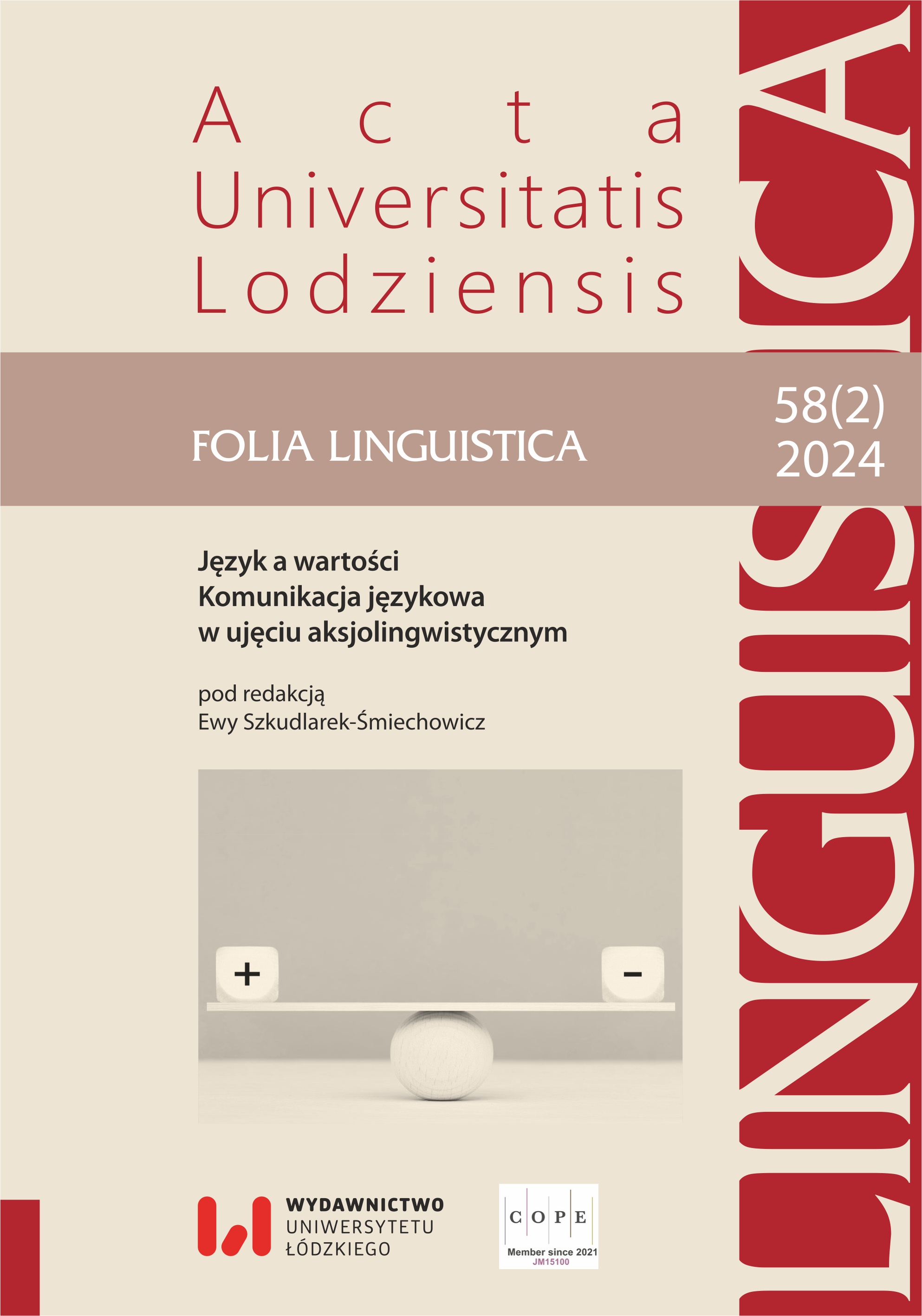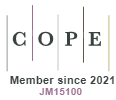Ridicule as an evaluative speech act (based on the example of contemporary Polish parliamentary discourse)
DOI:
https://doi.org/10.18778/0208-6077.58.2.27Keywords:
speech act, evaluative speech act, ridiculing, Polish parliamentary discourse, Polish political discourse, laughterAbstract
In the article, I attempt to describe ridicule: an evaluative speech act in which humor is a carrier of negative evaluation. The first aim of the paper is to characterize a model of ridicule through the prism of its illocutionary and perlocutionary goals, typical participants, typical construction of locution, basic felicitous and efficiency conditions, as well as communicative functions of comic malice that constitutes ridicule. The second aim of the paper is to test how the abstract model of ridicule operates in dynamic interactions determined by the specificity of contemporary Polish parliamentary discourse (covering 2019–2023). The analysis of the model ridicule is based on the speech act theory proposed by Austin (1962), developed and modified by Searle (1975, 1976) and Searle and Vanderveken (1985). The analysis of the aspect of ridiculousness was placed in the context of works on humor such as Hobbes’ (1954), Kant’s (2004), Bergson’s (1977), Dziemidok’s (1967), Minois (2021). The source of parliamentary ridiculing behaviors are stenographic reports from the sessions of the Polish parliament (the lower chamber) of its 9th term.
Downloads
References
Attardo S., 1994, Linguistic Theories of Humor, Berlin: De Gruyter Mouton.
Google Scholar
Austin J.L., 1962, How to do Things with Words, Oxford: Oxford University Press.
Google Scholar
Austin J.L., 1993, Mówienie i poznawanie, przekł. B. Chwedończuk, Warszawa: PWN.
Google Scholar
Bergson H., 1977, Śmiech. Esej o komizmie, przekł. S. Cichowicz, Kraków: Wydawnictwo Literackie.
Google Scholar
Chłopicki W., 1995, O humorze poważnie, Kraków: Polska Akademia Nauk.
Google Scholar
Dziemidok B., 1967, O komizmie, Warszawa: Książka i Wiedza.
Google Scholar
Gołaszewska M., 1987, Śmieszność i komizm, Kraków: Zakład Narodowy im. Ossolińskich.
Google Scholar
Hobbes T., 1954, Lewiatan, czyli materia, forma i władza państwa kościelnego i świeckiego, przekł. C. Znamierowski, Kraków: PWN.
Google Scholar
Hurley M., Dennet D., Adams R., 2020, Filozofia dowcipu. Humor jako siła napędowa umysłu, przekł. R. Śmietana, Kraków: Copernicus Center Press.
Google Scholar
Kanał Sejmu RP w serwisie YouTube, https://www.youtube.com/@SejmRP_PL (dostęp: wielokrotnie w 2023 i 2024).
Google Scholar
Kant I., 2004, Krytyka władzy sądzenia, przekł. J. Gałecki, Warszawa: PWN.
Google Scholar
Karwat M., 2006, O złośliwej dyskredytacji. Manipulowanie wizerunkiem przeciwnika, Warszawa: PWN.
Google Scholar
Korpysz T., 2015, Rozwój semantyczny rzeczownika „humor” w polszczyźnie. Przegląd leksykograficzny, „Poznańskie Studia Slawistyczne”, t. 9, s. 287–301, http://cejsh.icm.edu.pl/cejsh/element/bwmeta1.element.ojs-doi-10_14746_pss_2015_9_17 (dostęp: 15.03.2024). https://doi.org/10.14746/pss.2015.9.17
Google Scholar
DOI: https://doi.org/10.14746/pss.2015.9.17
Krauz M., 2021, Zniewaga jako akt mowy w świetle danych językowych i przepisów prawnych, „Język. Religia. Tożsamość”, t. 23, s. 53–70, https://jezyk.religia.tozsamosc.ajp.edu.pl/resources/html/article/details?id=217821 (dostęp: 15.08.2023). https://doi.org/10.5604/01.3001.0015.0291
Google Scholar
DOI: https://doi.org/10.5604/01.3001.0015.0291
Langton R., 2018, Blocking as counter-speech, w: D. Fogal, D.W. Harris, M. Moss (red.), New Work on Speech Acts, Oxford: Oxford University Press, s. 144–164. https://doi.org/10.1093/oso/9780198738831.003.0006
Google Scholar
DOI: https://doi.org/10.1093/oso/9780198738831.003.0006
Lyttle J., 2001, The Effectiveness of humour in persuasion: the case of business ethics training, „The Journal of General Psychology”, nr 128 (2), s. 206–216. https://doi.org/10.1080/00221300109598908
Google Scholar
DOI: https://doi.org/10.1080/00221300109598908
Minois G., 2021, Historia śmiechu i drwiny, przekł. W. Klenczon, Warszawa: Aletheia.
Google Scholar
Pisarkowa K., 1976, Pragmatyczne spojrzenie na akt mowy, „Polonica”, t. 2, s. 265–279.
Google Scholar
Rawski T., 2016, Śmiech a władza. Przegląd społecznych funkcji komizmu, „Studia Politologiczne”, t. 41, s. 240–258, http://www.studiapolitologiczne.pl/Smiech-a-wladza-nPrzeglad-spolecznych-funkcji-komizmu,115716,0,1.html (dostęp: 5.03.2024).
Google Scholar
Searle J.R., 1975, Indirect speech acts, w: P. Cole, J. Morgan (red.), Syntax and Semantics 3, New York: New York Academic Press, s. 59–82. https://doi.org/10.1163/9789004368811_004
Google Scholar
DOI: https://doi.org/10.1163/9789004368811_004
Searle J.R., 1976, A classification of illocutionary acts, „Language in Society”, nr 5 (1), s. 1–23. https://doi.org/10.1017/S0047404500006837
Google Scholar
DOI: https://doi.org/10.1017/S0047404500006837
Searle J.R., 1987, Czynności mowy, przekł. B. Chwedończuk, Warszawa: Instytut Wydawniczy PAX.
Google Scholar
Searle J.R., Vanderveken D., 1985, Foundations of Illocutionary Logic, Cambridge: Cambridge University Press, https://doi.org/10.1007/1-4020-3167-X_5
Google Scholar
DOI: https://doi.org/10.1007/1-4020-3167-X_5
Sprawozdania stenograficzne z posiedzeń Sejmu RP IX kadencji, https://www.sejm.gov.pl/sejm9.nsf/stenogramy.xsp (dostęp: wielokrotnie w 2023 i 2024).
Google Scholar
Tomczuk-Wasilewska J., 2009, Psychologia humoru, Lublin: Wydawnictwo Katolickiego Uniwersytetu Lubelskiego.
Google Scholar
YouTube Sejmu RP, https://www.youtube.com/@SejmRP_PL (dostęp: wielokrotnie w 2023 i 2024).
Google Scholar
Żygulski K., 1976, Wspólnota śmiechu. Studium socjologiczne komizmu, Warszawa: Państwowy Instytut Wydawniczy.
Google Scholar
Downloads
Published
How to Cite
Issue
Section
License

This work is licensed under a Creative Commons Attribution-NonCommercial-NoDerivatives 4.0 International License.










